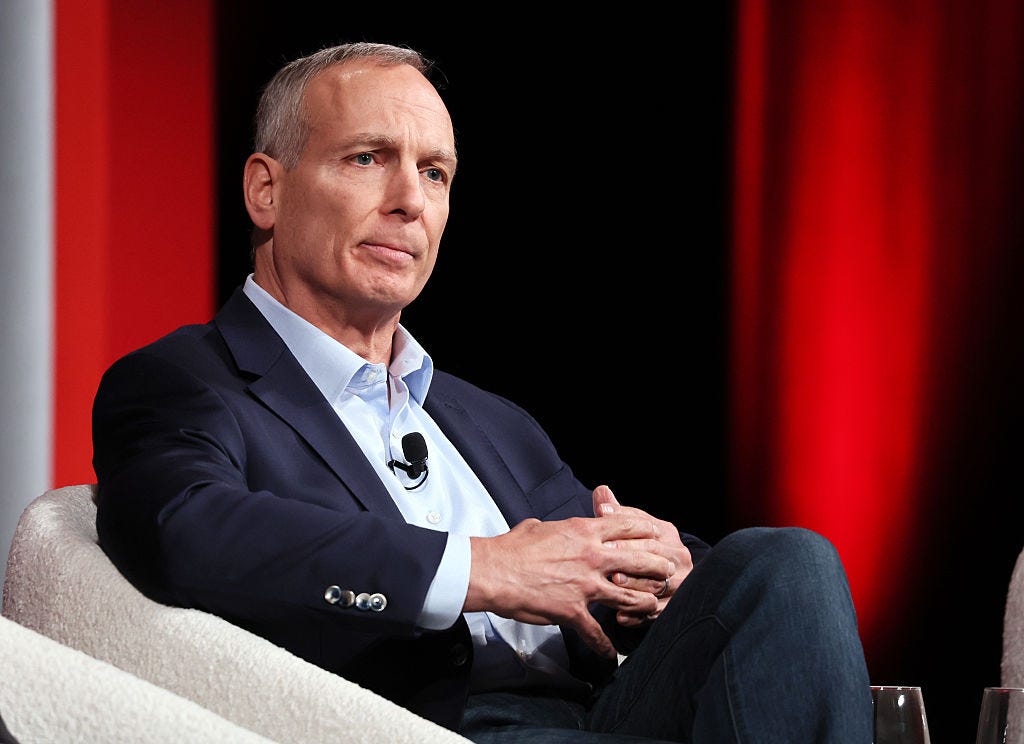Why does Booking still own OpenTable?
And if it ever sells… who’s buying?

Eleven years ago, Booking Holdings, then named the Priceline Group, acquired OpenTable for $2.6 billion. Booking owns a handful travel brands, including Priceline, Kayak, and RentalCars.com, but its pricey OpenTable buy was a big leap into the restaurant business from a company now worth about $180 billion. Separately, Booking and OpenTable are thriving. That doesn’t make them better together.
Seven years ago, I sat (uncomfortably, pregnant with my second baby) in the audience of a travel industry conference in New York, listening as Booking’s CEO, Glenn Fogel, admitted his company was falling short on its plans to integrate OpenTable into its travel- and experience-booking platforms.
“We have not done everything I wanted to do when we did the deal with OpenTable… yet,” he said. “We should be able to do something between the power of OpenTable and the power of our hotel brands, and be able to do it so it’s better for the customer.”
Yes, they should! I thought.
Fogel offered a few easy-to-envision suggestions. Restaurants could pull from the Booking’s robust data stores to offer visiting diners perks like free deserts and better tables, he said. Booking could become a marketing tool for OpenTable’s restaurants hoping to reach nearby travelers. It would work, because as Priceline’s then-CEO, Darren Huston, said bluntly at the time of the 2014 acquisition, “Travelers are diners.”
Wall Street analysts readily agreed, calling the deal “a no-brainer.”
It was, in theory.
In the decade since the deal, Booking’s brands have linked up… a little. Eventually, for example, diners could cash in OpenTable loyalty points for discounts on hotel stays booked on Kayak, a travel search engine. But OpenTable killed that program last summer, and larger promised synergies haven’t materialized to pushed the reservations service forward. Instead, OpenTable is looking outside of its corporate lineage to grow.
Maybe it’s time for Amsterdam-based Booking to let go?
Booking Holdings reported second-quarter earnings earlier this week.
During the call’s prepared remarks, Fogel, now in his ninth year as CEO, touted OpenTable’s new AI-powered concierge as proof of Booking’s bet on the tech to improve customer satisfaction. Booking doesn’t break out the financial performance of its individual brands, but did note in its filing that OpenTable’s growth contributed to an increase in revenue for the quarter.
Those are sweet, if small, soundbites. But business from Booking.com, the company’s flagship brand offering flights, hotels, cruises, activities, and more, dwarfs any contribution from OpenTable. On the Verge’s Decoder podcast last year, Fogel said Booking.com accounts for about 90 percent of the parent company’s total profit. Additionally, Booking’s business growth in the US — where OpenTable is the clear market leader in reservations — lags behind its growth abroad.
Still, Booking Holdings this week optimistically raised its guidance for 2025. “We are pleased to see that global travel demand trends continue to be steady so far in the third quarter,” said Ewout Steenbergen, Booking’s chief financial officer, on Tuesday’s call.
Of course, none of this has much to do with the 60,000-plus restaurants across multiple countries that are currently bookable on OpenTable, nor the company’s massive push to realign itself with some of the most well-known restaurants in America.
That’s because the game has changed.
OpenTable’s CEO told me as much.
When CEO Debby Soo and other company execs sat down a few years ago to plot the strategy that would become OpenTable’s return to cultural relevance, it became clear, she said, “that we are playing a very different game than some of our competitors.”
Onetime startups Resy and Tock each tried to upend the reservations status quo when they emerged in the 2010s. While neither managed to unseat OpenTable as market leader, both confidently signed as customers the sort of new, hot, high-end, and otherwise high-profile restaurants that communicated cool-by-association. As social media use skyrocketed — “Look at me!” the selfies said — competition for top restaurant customers hit a fever pitch.
By then, Resy and Tock had (separately) found a new owner in American Express, a credit card company able to profit from restaurants on its reservations platforms and the diners that spent money inside them. OpenTable felt it played at a disadvantage in this new dynamic, so to level the field — and win back restaurants — it called Visa.
“The problem with losing the best is a lot of people come to the site looking for a certain restaurant,” Soo told me last summer. “And for me, the focus of the company has been about the restaurants, because again, if you do not have the restaurants, we will not have the diners.”
OpenTable’s Visa partnership, which gives some cardholders special access to top tables, debuted a year ago with obvious intent: Use Visa’s resources to attract restaurants to OpenTable by sending big spenders their way — just as Amex has done for decades.
“We didn’t invent this,” Soo said.
I have heard exactly zero rumors of an OpenTable departure from Booking aside from the one I’ve made up here.
But if it was poised to find a new parent, OpenTable’s partnerships roster could give away the ending. Earlier this year, it inked a consequential deal with Uber that will soon let diners redeem points for Uber rides and food delivery. How practical.
(Since we’re starting rumors, it’s also worth noting that Uber CEO Dara Khosrowshahi ran Booking’s biggest rival, Expedia, for 12 years before stepping into his current role in 2017. Since then, he’s successfully tied Uber’s rides and delivery business together such that each refers significant traffic to the other. The OpenTable partnership has a similar referral goal for IRL dining.)
Like Visa, the Uber partnership feels more powerful (and relevant!) than any previous tie-in with OpenTable’s corporate siblings. For a modern reservations service, access to top restaurants — for both diners and for the company itself — trumps all else.
(There’d be other potential acquirers, too, of course. OpenTable could be particularly useful to a well-capitalized point of sale system, perhaps one that’s also dabbled in consumer marketing?)
A lot has changed in the years since I listened to Glenn Fogel speak about his OpenTable regrets.
A global pandemic upended travel and restaurants as we knew them, and the pieces never fell back together in quite the same way. Corporate priorities shifted as interest rates rose. My unborn baby is a now a first grader. And this restaurant technology newsletter, which was once part of the travel media company in charge of the aforementioned conference, is long divorced and proudly independent.
OpenTable has yet to transform Booking, and Booking hasn’t revitalized OpenTable on its own. (That is, aside from installing Soo in the top job after her 10 years at Kayak.) As I’ve learned: Travel and dining are a natural pairing… but they don’t have to stick together to win.



